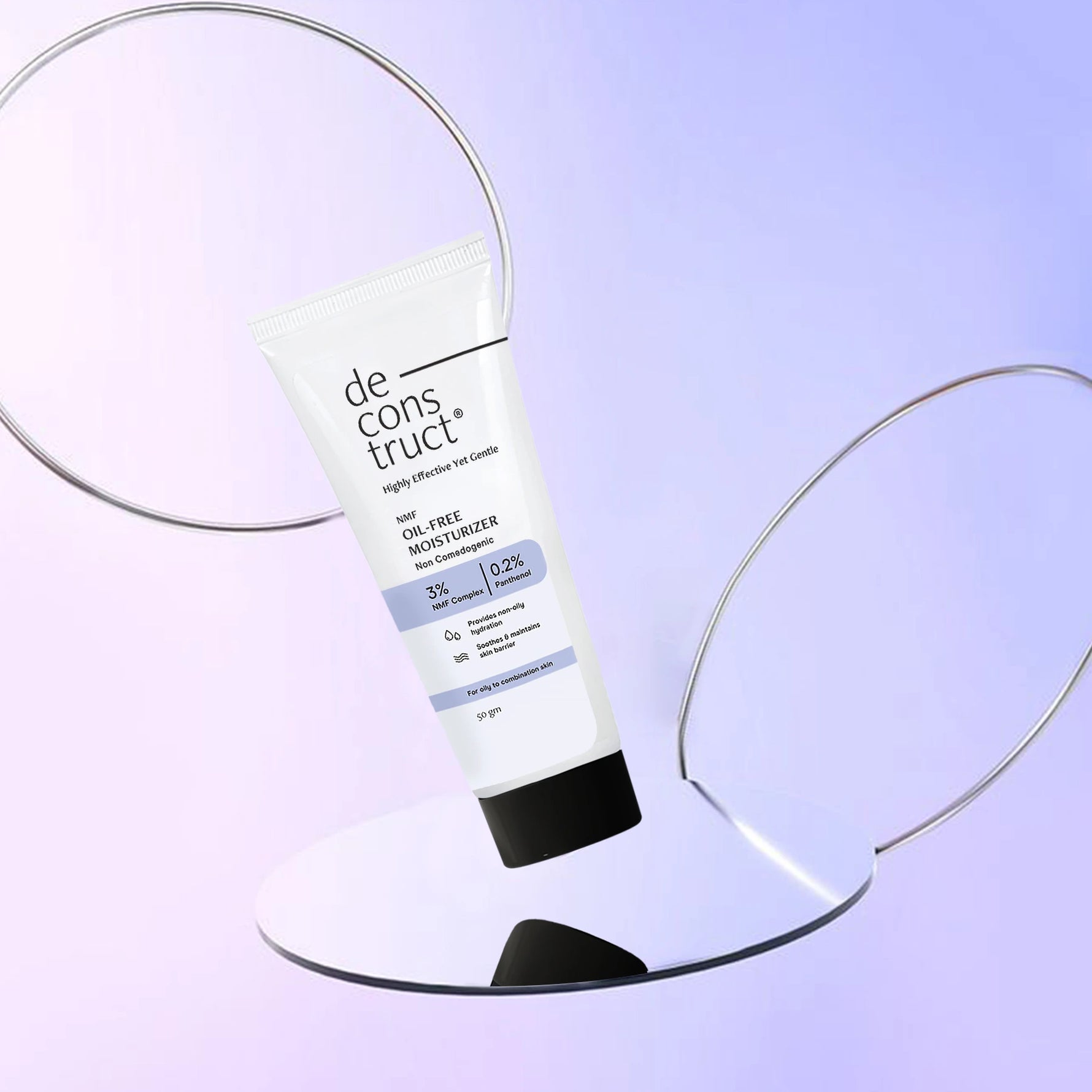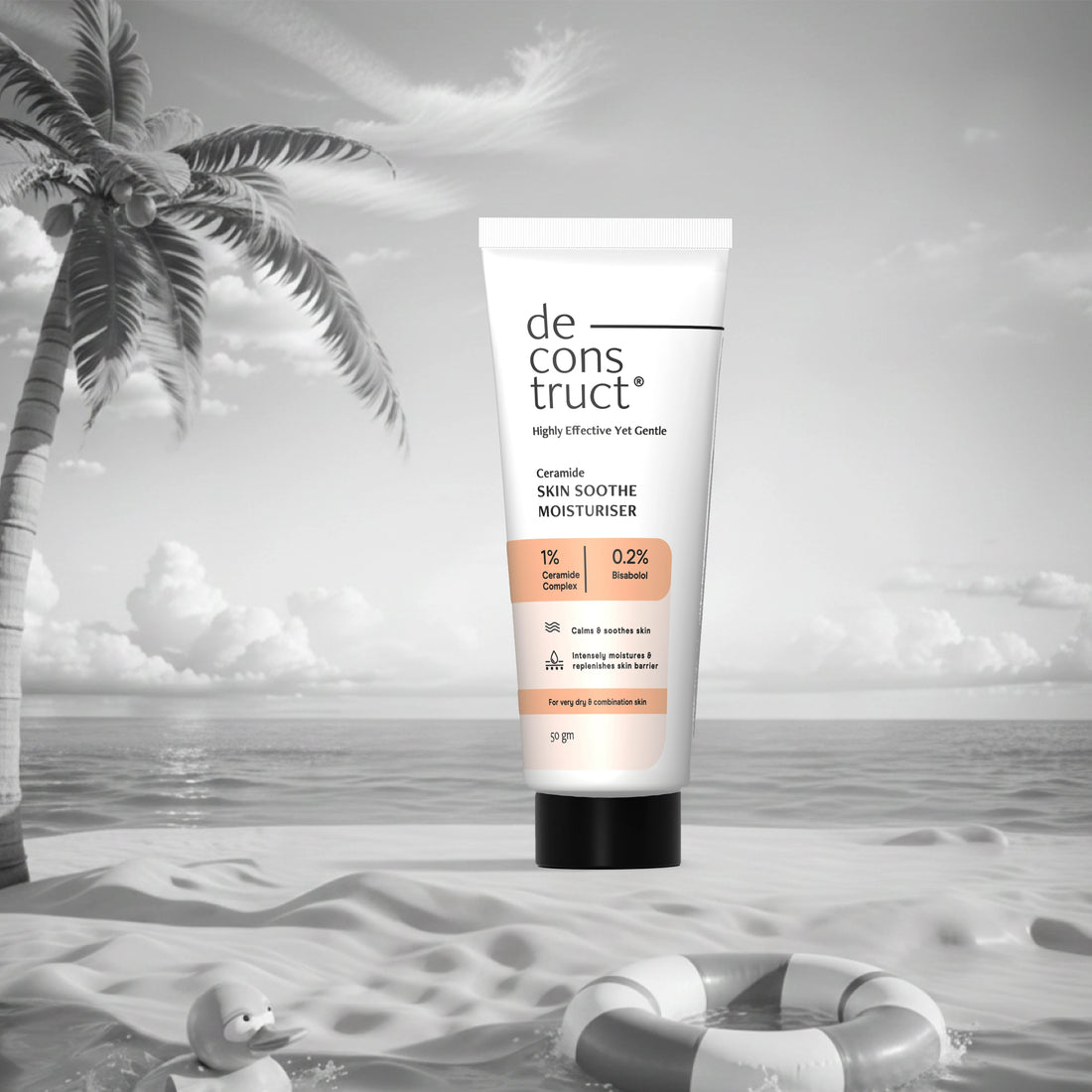If you have oily skin and are wondering if you need a moisturizer, the simple answer is yes. Oily skin can also become dry. Your skin could start producing more oil to compensate for the dryness if you don't use the right moisturizer, causing you to break out even more.

Deconstruct — Oil-free Moisturizer for Oily Skin
The most important thing is to pick a moisturizer that is oil-free (or very light and water-based) and made for oily skin. This article will explain why oily skin still requires a moisturizer, what ingredients to look for and avoid, how to choose between oil-free and water-based moisturizers, whether silicones are okay, and whether oil-free moisturizers truly work.
Why Oily Skin Still Needs a Moisturizer
Your skin really needs water to keep it healthy. Sebum, the oil your body makes, is not the same thing as the amount of water in your body. If your skin's barrier is weak or dry, it may create more sebum.
"Moisturizer makes oily skin greasier" is a myth that may be quickly busted. If you use the improper moisturizer, like heavy oils or occlusives, your skin could feel oily. But the correct oil-free moisturizer for oily skin can help your skin make less oil by keeping the moisture and the barrier in balance.
According to research by Anne Harwood [1], maintaining proper hydration and a healthy skin barrier helps regulate oil production and prevents excessive water loss, which is why moisturizing becomes important even for oily skin.
To sum it up, oily skin still needs a moisturizer since it adds water, which is different from the oil (sebum) that the skin makes on its own.
To understand how oil-free formulas actually work on oily and acne-prone skin, you can also read our detailed guide on oil-free moisturizers for oily and acne-prone skin.
What Ingredients Should I Look for in a Moisturizer for Oily Skin?
An oily skin moisturizer should have three types of helpful ingredients:
Hydrating ingredients (Humectants)
They are substances that pull water into the skin and keep it from drying out. Some beneficial humectants are hyaluronic acid, glycerin, and panthenol (vitamin B5), which calm and moisturize the skin barrier and make it look fuller. A study by E J van Zuuren [2] also highlights how humectants like glycerin improve hydration and overall barrier repair.
Oil-balancing ingredients
If you have oily skin, you need products that assist in controlling sebum and reduce inflammation. Some great oil-balancing ingredients are:
-
Niacinamide which helps get rid of shine and spots.
-
Zinc PCA makes your skin make less oil.
-
Green tea extract is full of antioxidants and helps you relax.
Barrier-strengthening ingredients
A functional barrier prevents the skin from producing excess amounts of sebum. Look for moisturizers with barrier-strengthening ingredients like ceramides and squalane that help keep the skin's structure strong and aid in skin repair.
What Ingredients Should I Avoid in a Moisturizer for Oily Skin?
Heavy oils & butters - Ingredients like coconut oil, cocoa butter, and lanolin are too thick for skin that is oily or prone to acne.
Occlusives that clog pores - Petroleum jelly and mineral oil (in excess) could attract and cling to dirt and oil.
Harsh alcohols and fragrances - Scents, drying alcohols could cause your skin to itch and create extra oil.
Comedogenic ingredients- Esters, such as isopropyl myristate and myristyl myristate, are likely to block pores.
Should I Use a Water-Based or Oil-Free Moisturizer for Oily Skin?
‘Water-based’ denotes that the formula is largely water with humectants and emulsifiers. It could also have a light oil or emollient in it. "Oil-free" moisturizers don’t have any excess oils or very few oils that don't create breakouts.
If your skin is oily or prone to acne, oil-free moisturizers are usually better because they don't add more oil or plug pores. Water-based might be good if it's very light non-comedogenic. An oil-free moisturizer goes a step further and doesn’t contain oils, so it is more targeted to oily or acne-prone skin types.
Both the kind of moisturizers are great, but oil-free moisturizers typically will provide more shine control and less chances of a clogged pore.
Ideal texture types
Choose gel, light emulsion or lotion that feel fresh, absorb fast, leave no heavy finish.
|
Feature |
Water-Based Moisturizer |
Oil-Free Moisturizer |
|
Base |
High water content, may include light oils/emollients |
No added oils, focuses on humectants + non-comedogenic emollients |
|
Feel on skin |
Light, may still feel slightly dewy |
Ultra light, often matte or fresh finish |
|
Risk of clogging |
Moderate, depends on oils/emollients |
Lower, designed for oily/acne prone skin |
|
Best for |
Normal to combination skin |
Oily, acne-prone, combination skin |
Are Silicone-Based Moisturizers Good for Oily Skin?
Dimethicone and cyclopentasiloxane are two types of silicones that create a barrier on the skin that lets air in and can make your skin feel smooth.
Pros
-
Makes skin feel smooth and gives a matte finish
-
Lightweight and doesn't usually block pores
Cons
-
Can feel heavy on the skin for some skin types
-
They could feel strange on sensitive skin, and in rare situations cause itching.
Silicones like dimethicone can cause acne, make the skin feel irritated or make those with sensitive skin have allergic responses. This can make your skin red, itchy, or break out.
Always patch test silicone-based products if your skin is sensitive or prone to acne.
Are Oil-Free Moisturizers Actually Effective?
It is a common myth that oil-free moisturizers don't hydrate the skin enough.
A good moisturizer that doesn't have oil in it could keep your skin moist without making it oily. So yes, they can definitely help you stay hydrated. The most important thing is that they don't use heavy oils; instead, they have mild emollients and humectants.
Benefits of oil-free moisturizer for oily skin:
-
It hydrates the skin, which stops the body from making too much sebum.
-
Less acne and a lesser chance of clogged pores
-
It helps keep the skin barrier healthy, which means it gets less oily over time.
|
Myths |
Facts |
|
“Oily skin does not need a moisturizer.” |
Oily skin requires moisture, too, else the skin over compensates for the lack of moisture by producing extra sebum. |
|
"Moisturizers that don't have oil can't deeply hydrate.” |
Products that don't include oil can give you deep hydration without making your skin feel heavy. |
|
“Putting on moisturizer will make greasy skin worse.” |
An oil-free moisturizer that is tailored for your skin type can help keep oil and barrier health in check. |
What Moisturisers Are Oil Free?
If you want a moisturizer that doesn't contain oil in it, here is a dermatologist-recommended option:
Deconstruct Oil-Free Moisturizer for Oily Skin is light, absorbs quickly, and is made for skin that is oily, acne-prone, or sensitive. It has 3% NMF Complex and 0.2% Panthenol, is oil-free and doesn't stick, and can keep your skin moist for up to 72 hours.
Are Oil-Free Moisturisers Good for All Skin Types?
When your T-zone is oily but the rest of your face feels normal or slightly dry, oil-free moisturizers are a wise daily choice because they hydrate you without making you feel heavy.
If your skin is extremely dry or your barrier is seriously damaged, an oil-free moisturizer might not suffice. To keep your skin comfortable and protected, you may need a richer cream or an extra layer of moisture.
When the weather changes (from cold and windy to humid) or if your skin's condition changes, you may need to alternate between a thicker and a lighter, oil-free moisturizer. For instance, in the winter, oily skin may feel tighter and need more moisture.
If your skin is oily in some areas but feels normal or slightly dry elsewhere, explore our curated range of moisturizers for combination skin that balance hydration without heaviness.
Final Thoughts: Finding the Right Moisturizer for Your Skin Type
An oily skin moisturizer should be light, moisturizing, and not make acne worse. The Deconstruct Oil-Free Moisturizer is great for skin that is greasy and likely to get acne. But keep in mind that using a cleanser, serum, moisturizer, and sunscreen together will always be better than using just one. Over time, your skin grows better, your oil production levels out, and your barrier gets stronger.
FAQS
Do oily skin types really need moisturizer?
Yes, oily skin still loses water due to environmental stressors. To prevent production of extra sebum, moisturize your oily skin every day.
Can oil-free moisturizers cause breakouts?
No, they shouldn't cause breakouts if the product is non-comedogenic and doesn't have heavy occlusive oils. They should help repair the barrier, hydrate and protect your skin.
Is gel moisturizer better than cream for oily skin?
Yes, gel or light emulsion textures soak in quickly, feel lighter, and don't leave a thick layer on oily skin as often.
[References]



